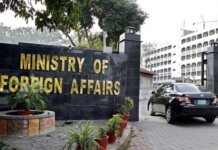Karachi, 29 September 2022 (TDI): A delegation from World Health Organization (WHO) met the Sindh Chief Minister, Syed Murad Ali Shah on Thursday. During the meeting, the delegation affirmed working with the Sindh government to help the flood victims.
.@DrMikeRyan along w/ WHO Rep. in Pakistan, Dr Palitha Mahipala & @WHOEMRO Emergency Director, Dr Richard Brennan met w/ CM Sindh @MuradAliShahPPP @SindhCMHouse to discuss the ongoing health response to flood devastation and to scale up the efforts within the next months. pic.twitter.com/69QNx3ALM2
— WHO Pakistan (@WHOPakistan) September 29, 2022
The delegation by WHO consisted of Mike Ryan, the executive director of the World Health Organization’s Health Emergencies program. Moreover, WHO’s Pakistan Representative, Palitha Mahipala, and Emergency Director, Richard Brennan were also present.
Accordingly, the Chief Minister updated the delegation on the situation of floods in Sindh. He highlighted the number of causalities and growing vulnerabilities of the flood-stricken people.
Karachi (September 29th, 2022) Sindh Chief Minister Syed Murad Ali Shah meets with a World Health Organisation (WHO) delegation led by its Executive Director Dr. Michael Ryan at CM House. pic.twitter.com/2Vx7dIYson
— Sindh Chief Minister House (@SindhCMHouse) September 29, 2022
Moreover, both sides exchanged views on how to manage the dangerous situation related to health.
WHO assures to extend every possible cooperation to Sindh government for mitigating sufferings & health issues of #flood affectees in province#FloodsInPakistan @WHOPakistan @WHO https://t.co/f0L1LbPUP3
— Radio Pakistan (@RadioPakistan) September 29, 2022
Recently, it was analyzed that flood victims are at a higher chance of getting water-borne
diseases. This bought a new issue for Pakistan which was already dealing with the massive floods that damaged many areas.
Correspondingly, the WHO assured to extend every possible cooperation to the Sindh government. The cooperation is to mitigate the suffering and health issues of flood affectees in the province.
In this regard, the visiting delegation of WHO announced the provision of many necessities to the flood victims. This includes one hundred small water purification machines and medicines, vitamins, and other items for flood victims, especially children.
Floods in Pakistan:
Due to heavy monsoon rains since mid-June, many areas of Pakistan are plunged into the water.
The scale of the humanitarian crisis in the flood-hit areas of Pakistan is unprecedented with more than 33 million people affected.
Additionally, over 1 million houses are damaged while over 600,000 persons are internally displaced in camps.
Moreover, about 1500 people have died due to these floods. While many people got homeless, many still are in danger because of growing vulnerabilities.
As Pakistan was unable to deal with these floods domestically, it called for international support. Thus, many countries and international organizations have helped Pakistan in bringing relief to the flood-stricken people.
Also read: WHO provides health facilities in flood-affected Sindh, Baluchistan
WHO in Pakistan:
The World Health Organization also aided Pakistan in dealing with the floods. It is noteworthy that owing to the floods, 1460 health facilities are damaged. This left millions of people lacking access to health care and medical treatment.
.@WHO is on the ground scaling up the health response to the devastation caused by floods in #Pakistan to support the efforts of the @GovtofPakistan and other partners. pic.twitter.com/t5u6rh1J9c
— WHO Pakistan (@WHOPakistan) September 28, 2022
With the growing vulnerability of disease outbreaks in flood victims, its responsibility has increased.
Correspondingly, WHO has increased surveillance for acute watery diarrhea, cholera, and other communicable diseases to avoid further spread.
It is also providing essential medicines and medical supplies to functional health facilities treating affected communities.
Furthermore, WHO has also diverted mobile medical camps, including those responding to COVID-19 teams, to affected districts.
It delivered 1 700 000 aqua tabs to ensure access to clean water and provided sample collection kits to ensure clinical testing of samples to ensure early detection of infectious diseases.








